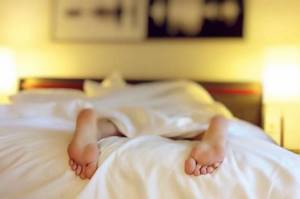How sleep and weight loss are connected: scientific findings
In recent decades, the amount of time people devote to sleep has been steadily declining, as has the quality of rest. This is due to workaholism (devoting a lot of time to work), gaming addiction (computer games at night) and changes in the rhythm of life in general. And the body mass index (BMI) [Verified source] of most people in recent years, on the contrary, has been increasing, which can be characterized as a trend towards an increase in body weight and obesity rates among the entire population of the planet.
Scientists did not leave these processes unattended and began to put forward their own theories about how sleep and weight loss are connected. Thus, numerous studies have shown that limited sleep time, less than 7 hours a day, can lead to metabolic disorders, weight gain, increased risk of obesity and the occurrence of many chronic diseases. However, a full rest of 8 hours, on the contrary, helps people on a diet lose weight faster.
Do you suffer from insomnia?
“Life without normal sleep is not life,” say experts from the Institute of Sleep and Wakefulness. Even if insomnia does not involve anything specific, it has a huge impact on our daily lives: it causes irritability, aggression, bad mood, memory loss, fatigue, muscle tension, eating disorders, difficulties in relationships with people, problems at work.

If your strength is not restored after sleep, and your body and brain do not get rest, you suffer from insomnia. The required duration of sleep varies depending on the individual characteristics of the body, so it is very difficult to derive general norms here. Only one thing is known: 95% of the population periodically suffers from lack of sleep.
! Warning: If you are considering taking sleeping pills, be aware that the sleep they induce is not natural sleep and will not have the expected effect on your figure and mood.

Sleeping pills disrupt the phases that are so valuable for our balance and metabolism. Not to mention the addictive effect and almost inevitable side effects. The best allies in the fight against insomnia are, of course, plants. They will help you regain healthy sleep and restore strength. Herbal preparations are available in the form of capsules, tablets and infusions.
- Passionflower (passion flower) contains alkaloids and flavonoids that relieve stress accumulated during the day and promote sleep. Passionflower prolongs sleep by one to two hours (if you need it).

- Valerian contains valeric acid and valepotriates. These substances put you to sleep with the same success as chemical sleeping pills (medicines), but unlike the latter, they do not produce side effects.

- Esholtsia (California poppy) contains alkaloids and sedatives (not narcotics). It helps you fall asleep, but does not make it difficult to wake up in the morning. Esholtsia gives a restful, healthy sleep and protects against nightmares.

- Kava contains kavalactones, which regulate sleep-wake cycles. Unfortunately, the sale of this plant is currently temporarily discontinued.

- Hawthorn calms the central nervous system.

- Oats are especially recommended in cases of insomnia caused by mental fatigue. It is also prescribed to people with hypersensitivity.

- Whiteweed helps people who are in a state of anxiety and restlessness fall asleep. This is not a poisonous plant.

- Poppy has a mild calming effect and is not addictive.

- Lemon balm (melissa) improves sleep. She calms and relaxes.

- Hops are an ideal sedative in cases of anxiety, stress or nervous insomnia.

Lack of sleep - weight gain: how lack of sleep affects our appetite
One common hypothesis about the link between lack of sleep and excess weight states that lack of sleep increases appetite. But why does this happen?
Special peptide hormones, ghrelin
and
leptin
play a key role in the formation of appetite. Ghrelin causes a feeling of hunger, and leptin provokes a feeling of fullness. The body naturally increases or decreases levels of these appetite regulators throughout the day, signaling the need to consume calories [Verified Source].
Lack of sleep can affect the production of these hormones. Thus, in one study, men who slept 4 hours a day released more ghrelin and less leptin in their bodies compared to those who slept 10 hours. Scientists then concluded that dysregulation of ghrelin and leptin may lead to increased appetite and decreased feelings of satiety in people deprived of sufficient sleep.
Additionally, several other studies have shown that decreased rest time affects food preferences. People who sleep less than 7 hours a night are more likely to consume high-calorie foods and carbohydrates [Verified Source].
Research
It would seem that the more a person moves, the fewer calories he burns. But in a dream, the human body is in a motionless state, which means it cannot effectively burn calories.

However, scientists have proven during research that people who sleep little are much more susceptible to overeating. How does this happen? It's all about hormones.
There is a sleep hormone - melatonin, which is responsible for making a person feel alert, rested, and in a good mood. This hormone is also responsible for the feeling of hunger that a person experiences. The scheme is simple: sleep less, feel more hungry, eat more.
Speeding up metabolism or slowing it down: how sleep affects energy conversion

Metabolism is the chemical process during which the human body converts incoming food and drink into the energy needed for life. We spend energy on any activity, such as breathing, walking or reading.
An active activity like exercise can temporarily increase your metabolism, but sleep does not. During the night's rest, the conversion of substances entering the body into energy slows down by 15% [Verified source] and reaches its lowest level in the morning.
Lack of healthy, quality sleep for 7-8 hours due to insomnia, apnea or other abnormalities in most cases leads to metabolic dysregulation. In addition, poor sleep increases insulin resistance, and the extra hours of wakefulness can increase a person's appetite, resulting in late-night snacking. A short night's rest can also disrupt circadian rhythms (fluctuations in the intensity of biological processes), leading to weight gain [Verified Source].
Thus, during sleep, metabolism slows down, and due to lack of sleep, metabolism disorders occur.
Video
Effective tips to help you lose extra pounds while you sleep:
- To lose weight while you sleep, try to fall asleep between 22:00 and 24:00. It is at this time that energy is restored in the body;
- Do not eat or drink 2-3 hours before bedtime. It is very important to eat right to sleep well;
- The quality of your sleep is also important. Arrange your bedroom. Choose beautiful bed linen made from natural fabrics. Buy a firm orthopedic mattress. Scientists have long found out that a comfortable bed is the key to losing excess weight while sleeping;
- Ventilate the room before going to bed;
- Just fall asleep and wake up at the same time;
- Sleep in silence and darkness. Hang thick curtains, buy earplugs for sleeping;
- Avoid alcohol, tobacco, caffeine;
- Exercise in the morning. If you go to the gym, then pay attention to swimming, aerobics, and cardio exercises;
- Try not to think before going to bed. Get all thoughts out of your head. Try to concentrate on your breathing, it should be calm and even.
Now you know how sleep affects weight loss, and how much sleep you need to lose weight while sleeping. We recommend getting enough sleep to feel good.
Sports and sleep: how to speed up metabolism and lose weight

Lack of sleep leads to negative consequences: a person feels sluggish, sleepy, and yawns more often than usual. In this state, it becomes unsafe to engage in any physical exercise, especially weightlifting, gymnastics and those sports that require balance.
Regular exercise can improve the quality of your sleep, especially if done outdoors. A little physical activity activates blood circulation, and the blood is saturated with oxygen and delivers it to all tissues and organs. Even an ordinary walk outside can have a positive effect on the quality and duration of sleep.
150 minutes of moderate-intensity exercise or 75 minutes of vigorous-intensity exercise per week improves concentration and reduces daytime sleepiness [Verified Source], and it also speeds up your metabolism, which can help you lose weight.
Adequate sleep is the path to a slim figure
From all of the above, it becomes clear that adequate sleep is an excellent way to prevent the development of obesity.
Unfortunately, sleep problems are not always easy to solve. Work schedules, family obligations, various illnesses, location of housing near busy streets are not a complete list of obstacles to a good night's sleep.

This, of course, does not mean that it is impossible to find effective treatments for sleep disorders. If necessary, you can use sleeping pills. Now there are quite good medications and physiotherapeutic methods for treating insomnia.
They tried to save money: the couple bought a dilapidated house from the 30s and renovated it
You can create a beautiful pattern on an accent wall made of wood: take note
Salt water, honey: soothe sensitive teeth with home remedies
If the problem is only that a person goes to bed late and gets up early due to a long-term habit, it is much easier to solve it. Even small changes in sleep duration or quality produce results. Avoiding strong coffee in the afternoon, meditation or relaxing music before bed, a glass of warm milk, or a warm bath with sedative herbs will help you fall asleep faster.
Even changing the curtains on the bedroom window to thick, light-proof ones can improve the quality of sleep and normalize, albeit to a small extent, the production of melatonin.
Lack of sleep: consequences in the form of obesity
In children and adolescents, there is an association between lack of sleep and an increased risk of obesity, the causes of which are not yet fully understood. Lack of sleep provokes metabolic disorders. Children become lethargic in the morning and refuse to eat breakfast, and skipping meals makes them want to eat at midday. Typically, they satisfy this desire with sweet, salty and fatty foods.
In adults, the relationship between poor sleep and obesity is less clear. However, an analysis of recent research [Verified Source] shows that people who sleep less than 6 hours a night will be more likely to become obese. Therefore, watch the amount of time you spend in bed and try to get enough sleep.
How to improve your sleep quality?

We have already talked about the effect of lack of sleep on fat accumulation. Let's determine the most effective ways to improve the quality of our sleep.
- Orthopedic mattress.
We have already briefly recalled the importance of creating the right microclimate. It has been proven that for quality sleep you need to choose the right surface. Today, an orthopedic mattress is the best way to improve sleep quality. - Microclimate in the bedroom.
When creating a bedroom interior, it is necessary to ensure that the brain does not receive unnecessary information through the senses. Make sure the room is soundproof and dark. Let us remind you that the optimal temperature at which quality sleep will be in the range from 16 to 22 degrees. - Sleep during the day.
An afternoon nap can be very beneficial for everyone. Many people believe that daytime sleep will negatively affect nighttime sleep. However, this is not true and the best proof of this is the Spanish siesta. Note that the duration of daytime sleep should not exceed an hour and a half and at the same time not be less than an hour.
More on the effect of sleep on fat storage:











